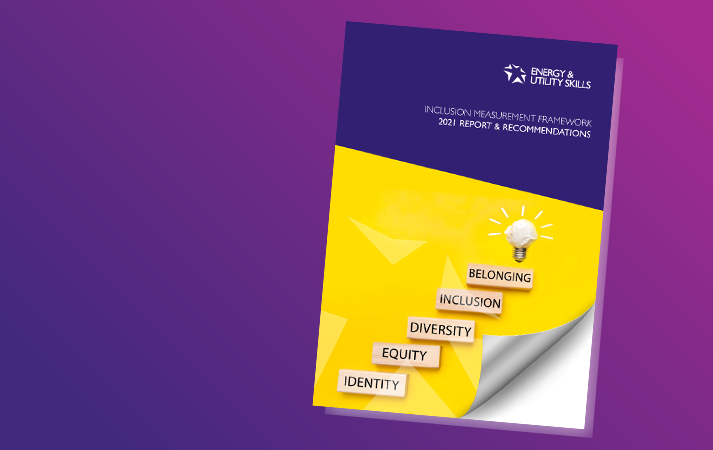Published on: February 24, 2022 at 8:56 AM
The 2021 results of the energy and utilities sector wide Inclusion Measurement Framework have been published by Energy & Utility Skills.
In its second year, the scope of the Inclusion Commitment Measurement Framework has been extended to include the personal reflections of industry CEOs on leading inclusion and their own experience of diversity.
The survey now considers diversity characteristics across the measurement themes of leadership, attraction and recruitment, retention and progression and representation of the additional characteristics of disability, sexuality, and religion.
CEO support and insights
Encouragingly, the survey reflects that every respondent of the CEO survey fully understands their personal role in driving inclusion, with 96% personally ensuring that equality, diversity and inclusion (EDI) is prioritised at executive levels within their organisations.
The CEO survey points to high levels of social mobility amongst industry leaders, with 91% having attended further education or higher, compared to 34% of their parents.
The results also show that 87% of CEOs have over 10 years’ experience within the sector, demonstrating high levels of senior-level retention
Positively, company leaders have a disability representation roughly equal to the UK workforce, as well as a significantly higher LGBTQ+ representation.
Industry Diversity – an improving picture?
Despite the strong support of industry leaders, the survey highlights that there is still work to do to improve EDI across energy and utilities industries.
The results reflect that representation of women in leadership roles is higher than numbers reported through the POWERful Women findings. However, this representation of 27% remains low and has marginally decreased since last year’s survey.
The report identifies that representation issues start at the job application stage, with women making up only 22% of applications.
Encouragingly, we can see a positive net movement of 6% for females within the workforce.
The results reflect the rate of decline of candidates from a Black, Asian and Minority Ethnic background through the recruitment process is less pronounced than last year. It also highlights the filtering out of gay men in the sector’s recruitment processes. There is still more to do to understand the reasons for this.
Black, Asian and Minority Ethic staff in the sector are better represented in development and progression which, with continued focus, should improve representation at leadership levels over time.
Reflective of the UK workforce, there is a larger group aged 46 and over holding senior positions across the sector. The sector can further explore the age profile of its leadership pipeline to ensure the inclusion of younger generations.
The report highlights the continued challenge of data disclosure with high levels of non-declaration in sexual orientation, disability, and religion.
A call to action
The report provides six recommendations and highlights the inclusion priorities for both industry and individual organisations.
Using the inclusion measurement framework, our industries can continue to measure and track their progress towards a diverse workforce that is reflective of the customers and communities it serves and identify areas for particular focus.
Phil Beach CBE, Chief Executive of Energy & Utility Skills, said:
“This measurement framework underpins the Energy & Utilities Inclusion Commitment, providing an important snapshot of the progress our industries are making to increase diversity and inclusion as part of the Inclusion Commitment.
“It is particularly positive to see that this year there has been a focus on CEOs, and on the protected characteristics of disability, and religious belief.
“It is also reassuring to see the high levels of commitment from CEOs across the energy and utility industries in leading inclusion. We can see some positives in the increases in Black, Asian and Minority Ethnic colleagues joining, and a positive net movement of women within the sector workforce.
“The results highlight a number of inclusion priorities for our own organisations and to address the industry-wide challenges we face.
“We will continue to measure and track our progress towards a diverse workforce that is reflective of the sector’s customers and communities, and this report should be a catalyst for us to redouble our efforts to drive change.”
Visit our Inclusion Commitment Measurement Framework webpage to learn more.
